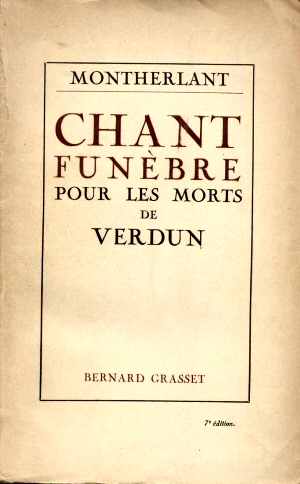 |
Enrolled as a private in the infantry, Henry de Montherlant is seriously wounded in 1918. Thereafter author of several particularly sophisticated texts, like his famous ‘Reine Morte’ ("Dead Queen") who could move my adolescent spirit some times ago, he wrote several novels and war memories : 'Service Inutile' ("Useless Service") - (1935), 'La Relève du Matin' ("The Morning Relief") - (1920), ‘Le Songe’ ("The Dreaming") - (1922). But more than all these, it is in ‘Chant Funèbre pour les Morts de Verdun’ ("Funeral lament for Deaths of Verdun") - (1924) that the talent vibrates the best, reporting with a very solemn emotion the author’s pilgrimage of the in Verdun, dedicated as proof of friendship to the Oeuvre of the Ossuary of Douaumont. |
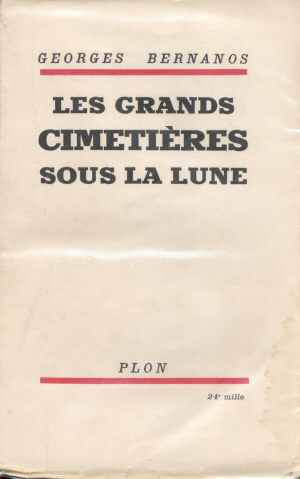 |
In August 1914, George Bernanos, a french writer seeking his personal style, is disabled by the Army. He though enrolled as a volunteer, and lives the war in the trenches. It is in the Twenties that his real career of famous writer will begin, with ‘Sous le Soleil de Satan’ ("Under the Satan’s Sun"). Living in the Balearic Islands in 1936, he wrote his famous ‘Journal d’un Curé de Campagne’ ("Newspaper of a Countryside Priest"), and attended, horrified, the beginnings of the spanish Civil War. Its book ‘Les grands Cimetières sous la Lune’ ("The Large Cemeteries Under the Moon") - (1938) is a violent indictment against the warmongers, and integrates many references to his own experiences of 14/18. |
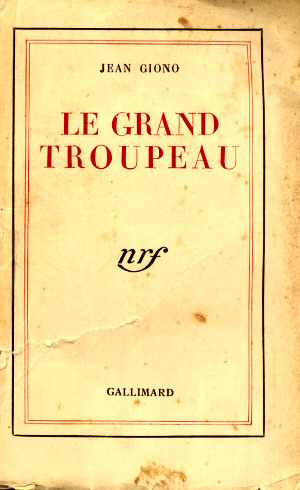 |
What a mastery of the french language ! What an accuracy in the words ! Jean Giono, originating from Manosque in the south of France, and who finished the war as a 'soldier of second class, without the Military Cross ', and who will be afterwards a little too close from the Vichy french collaborationist government in 40/45, is really inspired when he imagines in ‘Le Grand Troupeau’ ("The Big Herd") (1931) a parallel between the sheep, multitude took along in transhumance, and soldiers led to the war. Absolutely beautiful pages, where the reading must be done at the second degree, and with meditation. Like in 'the absent body vigil' in a small Provence village, candles surrounding a nude table where the body of a beloved one, disappeared in the war, is missing, the pity inspired by these pages will transport you... |
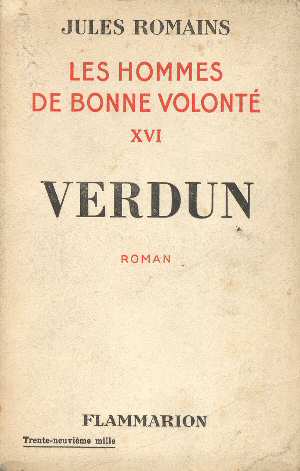 |
Jules Romains only made the war in an auxiliary service. But everyone agree to recognise that the two books of his multi-volumes novel saga ‘Les Hommes de Bonne Volonté’ ("The Men of Goodwill") dedicated to the period of Verdun 1916 are seizing of truth. In 'Prélude à Verdun' ("Prelude to Verdun") - (1938), and "Verdun" - (1939), Jules Romains paints with an intense dramatic intensity the first minutes of the titanic battle, then the desperate fights that happened there. Wonderful art !
|
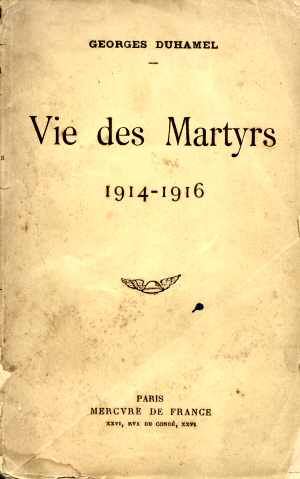 |
Here is one of the books that provoked the criticisms of Jean Norton Cru. Little known author before 1914, it is with his memories collected as a Doctor in the french Army during the Great War that the literary career of Jean Duhamel began. Author thereafter of very famous books, and still widely studied in the colleges (‘Le Notaire du Havre’ – ("The Notary of Le Havre"), part of the multi-volume novel "Les Pasquier"). Its 3 books ‘La Vie des martyrs’ ("Life of the Martyrs ") - (1917), ‘Civilisation’ ("Civilization") - (1918), and ‘Les 7 Dernières Plaies’ ("7 Last Wounds") - (1928), are gathering very stylised portraits of wounded soldiers or members of the medical profession in the army. The great mastery of the french language makes it possible to easily achieve the goal of these works that are made to inspire pity. Read those phrases for yourself, and listen to you, all alone, distress guaranteed ...
|
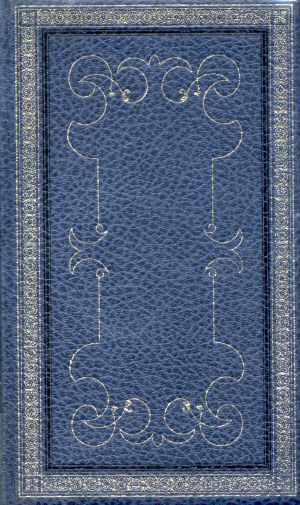 |
If Mac Orlan was to be famous after the war, being among other titles the author of the classical ‘Quai des Brumes’ ("Fogs Quay"), who inspired one of traditional French cinema the 1930’s years, his war memories ‘Propos d’Infanterie’ ("Matter of Infantry ") - (1917), ‘Les Poissons Morts’ (" Dead Fishes") - (1917), ‘Dans les Tranchées’ ("In the Trenches") - (1939) interest our theme. Only but excusable shadow on that screen, he declares to suffer from an amnesia for the scenes of combat, that are then missing in the stories. HIs feelings when returning to Verdun after the war, noted in "Verdun" (1934) are among the most moving on the pilgrimage, and most known..... |
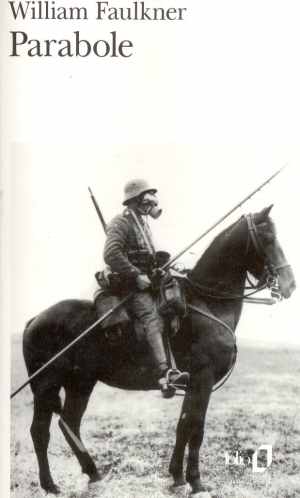 |
Here is both an original and bold idea, making a parallel, a 'Parabole' ("Parabola") (with the literary direction of the term) between the last hours of Jesus Christ surrounded by her apostles then his resurrection, and a escouade of 12 French soldiers isolated by the last German offensive from 1918 in top from a hill, around a corporal. Successful stylistic exercise by William Faulkner ! |
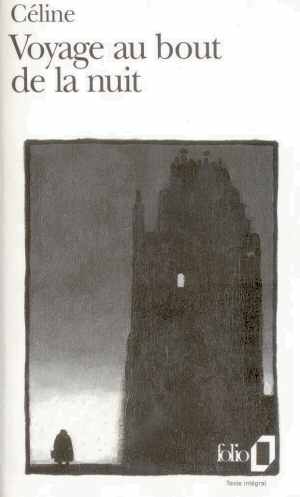 |
Young doctor, Louis-Ferdinand Céline enrolled as a volunteer in the infantry. Noticed for his heroism in 1915, he then was wounded and disabled. It is its deep disgust for the war that he expresses in his novel ‘Voyage au Bout de la Nuit’ ("Journey at the End of the Night") whose first chapters are a slightly disguised writing of his own war memories. From revolt to despair, this book is a violent shout. Celine also wrote the splendid the ‘Mort à Crédit’ ("Dead with Credit"), before sympathizing with the Vichy regime during 40/45 war, which will bring him to a collaboration trial in 1950, |
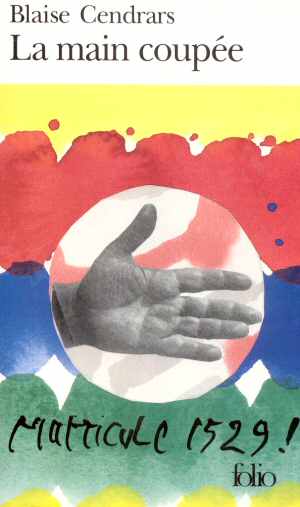 |
A 'special item', this Blaise Cendrars ! Swiss citizen, enrolled for the duration of the war in the Foreign Legion, his book ‘La Main Coupée’ ("the Cut Hand") - (1946) abounds in strange characters and colored memories. Only little problem, the veracity of some of his memories was doubted, its unit not having taken part in some of the reported battles. But his amputated arm, following a serious wound received in Champagne, near the Navarin farm on September 25, 1915, is quite real, and his style is so modern... Cendrars the adventurer will also tell a little of his war in ‘L’Homme Foudroyé’ ("The Blasted Man") - (1945), and in a poem ‘J’ai Tué’ ("I Killed"), before being successful with his other more exotic books... |
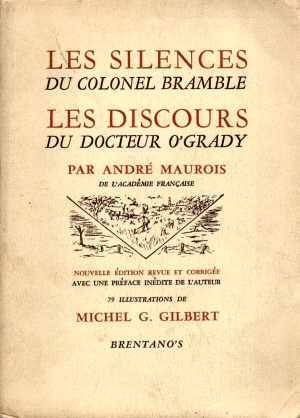 |
Thanks to his mastery of the English language, André Maurois obtained a role of french liaison officer near the British Army. His two works, often joined together in only one volume, ‘Les Silences du Colonel Bramble’ ("The Silences of the Colonel Bramble") - (1918), and ‘Les Discours du Colonel O’Grady’ ("The Speeches of Colonel O' Grady") - (1922) are interesting for the humorous picture that they draw of the shock of the French and English cultures during the conflict. Of course, these are ‘only’ headquarters witnesses, but the derision spirit is finally rather British ! |
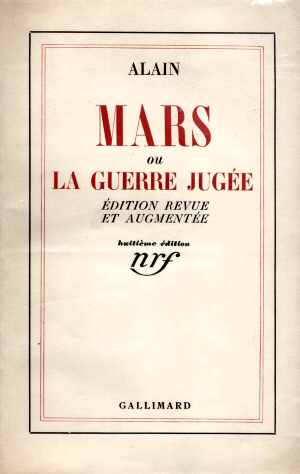 |
Very famous french philosopher for his very many ‘Propos’ ("Remarks"), Alain was initially a telephone operator in a heavy artillery unit. He drew from this experience matter to develop the nonsense of the war, in his philosophical work ‘Mars, ou la Guerre Jugée’ ("Mars, or the War on Trial”) - (1921) mainly written during the conflict. His war memories are consigned in a much more accessible way in his ‘Mémoires de Guerre’ ("Memories of the war") - (1933). In those lines, his experience of Verdun seen by heavy artillery troops has a rather original value of witness. |
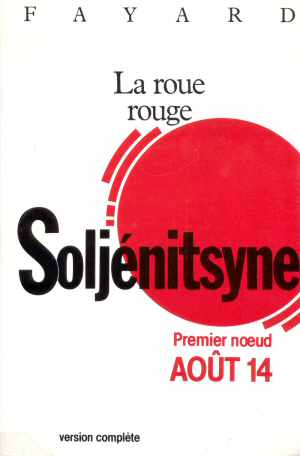 |
I wish plenty of courage to anyone who would like to read of this monumental work entitled ‘La Roue Rouge’ ("The Red Wheel") reporting in tiny details the Russian revolution in 1917. Soljenitsyne did not know the WWI, but he knows how much this conflict has been at the base of the major transformations of his country, Russia. Despite all that, the first volume of this monument, "August 14", delivers a faithful and seizing version of the combats of the beginning of the war in Eastern Prussia, where the weapons fate hesitated a long time before offering the German victory at Tannenberg. |
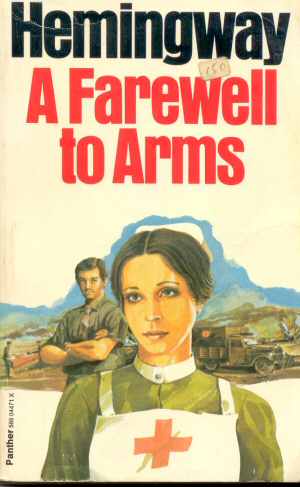 |
"A Farewell to Arms", by Ernest Hemingway, is a highgly autobiographical novel of this future best-seller author (who never heard of the famous "The Old Man and the Sea"?), American volunteer as stretcher-bearer on the front of Italy. The scenes of panic of the italian retreat in 1915 are memorable, and help to forgive the melodramatic end which seemed to me so unnecessarily sad when, as a kid, I saw the Hollywood film which was derived from this book and cried... |
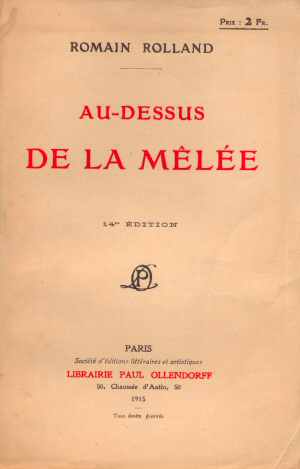 |
Romain Rolland inaugurated before the war the fashion of the saga novel with his 10 volumes of "Jean-Christophe". Too old to be mobilised in 1914, he wrote from Switzerland a series of articles under the generic title ‘Au-Dessus de la Mèlée’ ("Above the Fray") deploring that the two people of the same civilisation could sink this latter in the catastrophe. These beautiful pages were granted by the Nobel Prize of Literature 1916... and the offended incomprehension of the two belligerent sides ! |
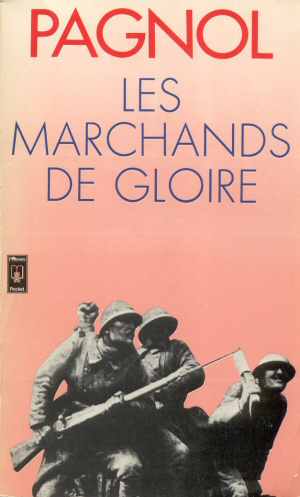 |
Unforgettable french author of the Trilogy "Marius", "Fanny" and "César", of ‘Manon des Sources’ ("Manon from the Springs"), ‘La Gloire de mon Père’ ("My Father’s Glory")..., Marcel Pagnol began his literary career by less known oeuvres, among which this part 'Marchands de Gloire' ("Merchants of Glory") where he denounces those people exploiting after war the memory of dead soldiers on the fields of glory. |
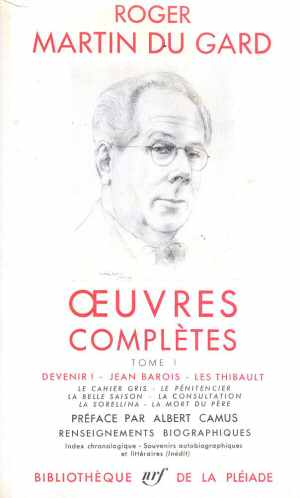 |
Roger Martin du Gard is another of the great names of the novel sagas. In his monumental work of 8 volumes, "Thibault", he develops the destinies of the members of a family, telling with much talent the family upheavals brought by the conflict, and in particular the martyrdom of the soldiers wounded by the gas. |
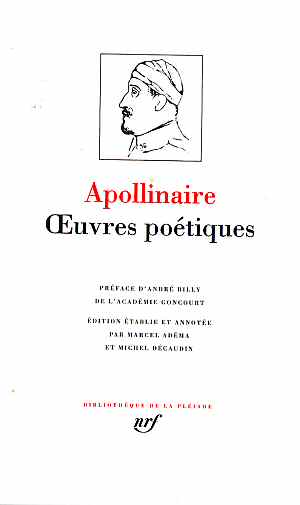 |
Guillaume Apollinaire, of a russo-polish origin, yet was a famous poet, linked to the Paris artistic world (Picasso was his personnal friend) when he enrolled in the French Army in 1914. The superb words of "Calligrammes", "Il y a","Poèmes à Lou", "Le Guetteur Mélancolique", "Poèmes à Madeleine" and "Poèmes à la Marraine", gathered in "Oeuvres poétiques" will mix his military experience in the 38 Art. Regt. then the 96 Inf. Regt. with his passion for the girls he loved. Trepaned in 1916 because af a bad wound received in the Bois des Buttes (Aisne), he died in Paris of the spanish influenza the 9th november 1918. |
|
|